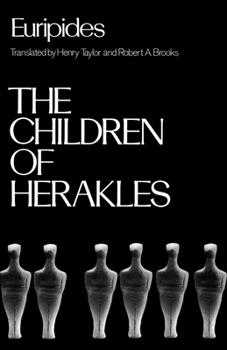The Children of Herakles
Select Format
Select Condition 
Book Overview
One of the shortest plays in Greek drama, The Children of Herakles offers enough action for two or three plays of normal length. But this very richness and complexity have made the play elusive, subject to dismissive readings, and extraordinarily difficult to translate; in consequence, it has suffered from neglect over the ages. This vibrant new translation makes clear that The Children of Herakles is actually a wonderfully well-crafted work of art,...
Format:Paperback
Language:English
ISBN:019507288X
ISBN13:9780195072884
Release Date:January 1992
Publisher:Oxford University Press
Length:112 Pages
Weight:0.25 lbs.
Dimensions:0.3" x 5.4" x 8.1"
Customer Reviews
1 rating
Euripides on the age old question of political refugees
Published by Thriftbooks.com User , 21 years ago
"The Children of Herakles" has usually been considered a minor political play by Euripides. First performed in 430 B.C.E. it tells of how the children of Herakles were exiled by from their home by the murderous King Eurystheus of Argos (the one who imposed the famous Twelve Labors on the demi-god) after their father's death. The children and their mother fled from country to country in search of sanctuary until, of course, they came to Athens. At first, the Athenians are reluctant to grant asylum, since Eurystheus might bring political and military strife on the city. But Demophon, King of Athens, agrees to admit them. Indeed, the army of Eurystheus surrounds the city and the oracles declares that the safety of Athens depends on the sacrifice of a virgin. Macaria, one of the daughters of Herakles, offers herself as the sacrificial victim. There is then a surprising twist as Eurystheus is captured and Alkmene, the mother of Herakles, insists that the tyrant be put to death. The play has usually been considered to be nothing more than a glorification of Athens, but, of course, in more contemporary terms it is worth reconsidering this Greek tragedy as a look at the problem of political refugees. This comes approach focuses on the debate the Athenians have over accepting the refugees. In this context it is not simply that Athens is a great place because it accepts the children of Herakles but rather that doing so is a political action of some significance; historically we know that the Athenians were not as generous as Euripides depicts them, but then we also recognize that the tragic playwright was try to inspire his audience. There is also a clear sense of the refugees as being heroic rather than pathetic, not only because of Macaria's willingness to be sacrificed but simply because they have survived. You can consider every refugee to be a success story because they have survived and made it out of their troubled homeland alive. "The Children of Herakles" works well as an analog to "Medea," with the one play dealing with the topic of how Athens treated refugees and the other touching on how the city tolerated foreigners. However, as with other plays by Euripides, such as "Trojan War," this tragedy is also a meditation on the effects of war. This is one of the shortest plays in Greek drama, but it is arguably one of the most complex of the plays of Euripides. The play suffers from having a particular character dominate the action or a truly great heroic scene and this is never going to be one of the first Greek tragedies anybody is going to look at (indeed, it apparently was never performed in the United States until just recently). But even if it comes at the end of your study of Euripides, it is still a play worth considering for what it says about the playwright and his attempts to inspire his Athenian audience.






